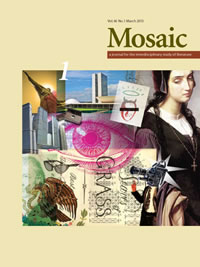Issue 46.1
Overview

General Issue
Published: March 2013
View the issue introduction or see the issue summary and contents below.
10 essays, totalling 192 pages
$21.95 CAD
In several cases through a thematics of “the hand,” the essays in this richly diverse issue consider the verbal-visual or word-image relation, the transition to electronic textuality, trauma, selfhood, witnessing, poetics, ethics, aesthetics, metaphysics, cosmopolitanism, and sovereignty.
The Ethics of the Melancholic Witness: Janet Frame and W.G. SebaldJosephine Carter This essay examines how two twentieth-century writers, Janet Frame and W.G. Sebald, represent the ethical responsibilities of the witness in relation to melancholia. | |
Shaking Hands with Other People’s Pain: Joe Sacco’s PalestineRebecca Scherr This essay examines Joe Sacco’s graphic strategies for representing the pain of others in his first collected work, Palestine. In particular, I argue that Sacco draws on a kind of “haptic visuality” when representing pain and suffering and, in doing so, reformulates standard forms of looking at “the other.” | |
Nabokov’s Aesthetic Bergsonism: An Intuitive, Reperceptualized TimeLaci Mattison Vladimir Nabokov’s writing elucidates and revises Henri Bergson’s philosophy. By examining Nabokov’s idiosyncratic engagement with Bergson’s thought in Speak, Memory, this essay demonstrates Nabokov’s temporal layering of space, which is predicated on intuition and aesthetic patterning(s). The essay concludes with comments on Spinozian ethics, as integral to intuitional aesthetics. | |
Ethics, Aesthetics, Modernism, and the Primitive in P.K. Page’s Brazilian JournalSuzanne Bailey This essay aligns Page’s representations of Brazil with modernist responses to ostensibly primitive cultures, arguing that Page participates in a version of ethnographic salvage or a recuperation of exotic cultures within an idealized, timeless state. | |
The Intricacies of Cosmopolitanism: Shirley Geok-lin Lim’s Among the White Moon FacesMinhao Zeng Within the critical framework of cosmopolitanism advanced and refined in the past decade, this essay aims to demonstrate how Lim’s Among the White Moon Faces: An Asian American Memoir of Homelands brilliantly captures the complexities, ambivalences, and contradictions of cosmopolitanism and also poses further challenges to this issue. | |
The Presence of Phenomenology: Hegel and the Return to MetaphysicsTodd McGowan By recognizing the connection between deconstruction and phenomenology, this essay argues that we can see how deconstruction has improperly targeted metaphysics, thereby creating the possibility for a return to metaphysical questions and metaphysical thinkers, especially Hegel. | |
Donald Barthelme and the Emergence of the Dynamic PageDaniel Punday The dynamic page has emerged as the basis for contemporary reading in an electronic environment. Donald Barthelme’s fiction explores many of the narrative issues raised by the dynamic page even before the widespread adoption of electronic textuality and graphical user interfaces, and can help to resolve debates about the agency of writer and reader in electronic textual environments. | |
Hart Crane in Mexico: The End of a New World PoeticsSusanne E. Hall While critics usually read Hart Crane in national terms as a U.S. poet, this essay looks at Crane transnationally, focusing on the time he spent in Mexico shortly before his death, in order to suggest that Crane’s personal interactions with Mexican culture and Mexicans of indigenous descent destabilized his visionary poetics. | |
‘Murder Everywhere’: Whitman, Lish, and the Fate of Self-CelebrationGeoff Hamilton This essay considers Gordon Lish’s invocation of Walt Whitman in his novel Dear Mr. Capote. The novel illustrates, I argue, a profound evolution in the representation of literary self-celebration in American literature and suggests how contemporary efforts to celebrate oneself have reversed the optimistic potential assigned to them by Whitman. | |
The Modality of Sovereignty: Agamben and the Aporia of Primacy in Aristotle’s Metaphysics ThetaNahum Brown This essay offers an examination of Agamben’s statement that there is an important ambiguity in Aristotle’s Metaphysics Theta as to whether actuality or potentiality is primary. I argue that this ambiguity is significant because it exposes the ontological dimension of Agamben’s paradox of sovereignty. |